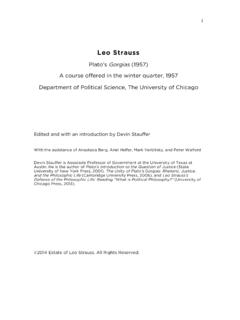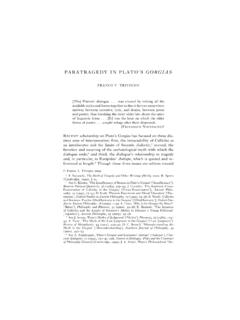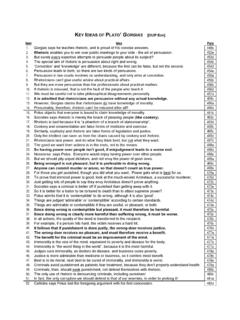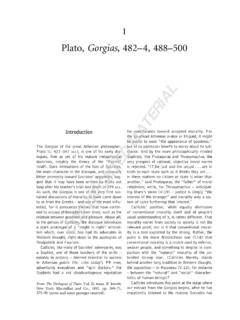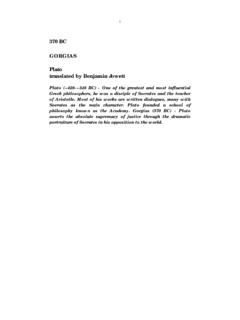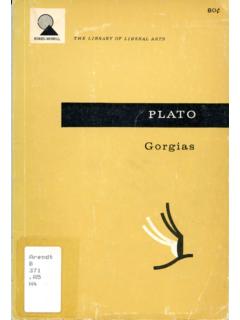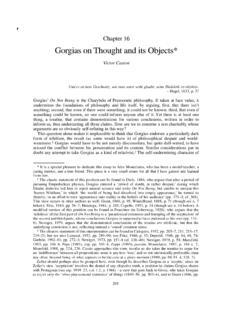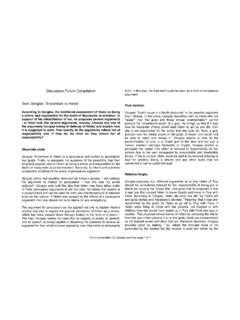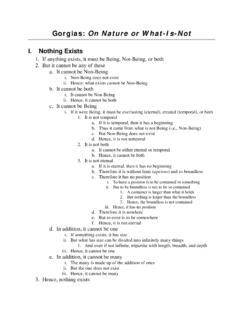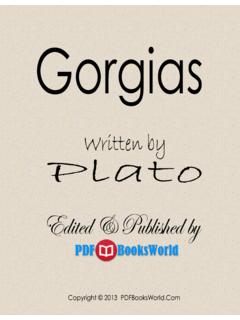Transcription of Leo Strauss - Amazon Web Services
1 Leo Strauss Plato s gorgias (1963) Plato: Political Philosophy A course offered in the autumn quarter, 1963 The Department of Political Science, The University of Chicago Edited by Devin Stauffer Devin Stauffer is Associate Professor of Government at the University of Texas at Austin. He is the author of Plato s Introduction to the Question of Justice (State University of New York Press, 2001), The Unity of Plato s gorgias : Rhetoric, Justice, and the Philosophic Life (Cambridge University Press, 2006), and Leo Strauss s Defense of the Philosophic Life: Reading What is Political Philosophy?
2 (University of Chicago Press, 2013) With assistance from Aidan Beatty, Ariel Helfer, Will Selinger, and Mark Verbitsky 1967 Estate of Leo Strauss 2014 Estate of Leo Strauss . All Rights Reserved. gorgias , 1963 Table of Contents Editor s Introduction i iv Note on The Leo Strauss Transcript Project v vii Editorial Headnote vii Session 1: Introduction (447a 447d) 1 20 Session 2: gorgias section (447c 452e) 21 48 Session 3 (unrecorded) Session 4: gorgias section (457c 464a) 49 72 Session 5: gorgias , Polus sections (463a 469c) 73 99 Session 6: Polus section (469c 474d) 100 128 Session 7: Polus section (474d 481b) 129 157 Session 8: Callicles section (481b 486d) 158 184 Session 9.
3 Callicles section (486d 491d) 185 215 Session 10: Callicles section (491d 497c) 216 241 Session 11: Callicles section (497b 501e) 242 272 Session 12: Callicles section (502d 507d) 273 298 Session 13: Callicles section (507 513c) 299 327 Session 14: Callicles section (513c 520b) 328 357 Session 15: Callicles section; the myth (520c end) 358 381 i Preface to Plato s gorgias Devin Stauffer Leo Strauss taught two seminars at the University of Chicago on Plato s gorgias , the first in the winter quarter of 1957 and the other six years later, in the fall quarter of 1963.
4 He was also teaching a seminar on Plato s gorgias at St. John s College in Annapolis in the fall of 1973 when he died. Only the transcript of the 1957 course remains, whereas there are audiotapes of the 1963 course and of a single session (what appears to be the second meeting) of the 1973 seminar at St. John s. When he died rather suddenly in 1973, Strauss was not only in the midst of teaching the seminar on the gorgias but had also begun work on an essay on the gorgias which he intended to include in Studies in Platonic Political Philosophy. Since we have a tape of only one session of the 1973 seminar, and since both that seminar and his work on an essay on the gorgias were cut short by his death, students and scholars of Strauss must rely for access to his interpretation of the dialogue primarily on the two earlier courses.
5 Both have now been edited. When Strauss gave his first seminar on the gorgias in 1957, he was finishing one of his greatest works, certainly his deepest and most detailed statement on a modern author: Thoughts on Machiavelli, published in 1958. Strauss dated the Preface, which appears to have been written after the completion of the rest of the work, as December of 1957. We can assume then that in the fall of 1957 Strauss was in the final stage of his work on Thoughts on Machiavellii, and thus that Machiavelli was still very much on his mind as he was teaching the gorgias .
6 A note late in Thoughts on Machiavelli can perhaps provide a clue to a connection between Strauss s work on Machiavelli and his interest in the gorgias : Note 219 to chapter 4 comes in an important section near the very end of Thoughts on Machiavelli where Strauss compares Machiavelli s thought, especially regarding the status or meaning of philosophy, with the thought of the classics. This is the section of the work in which Strauss is most explicitly critical of Machiavelli. He argues that the consequence of Machiavelli s analysis of the political as if it were not ordered toward the supra political or as if the supra political did not exist is an enormous simplification and, above all, the appearance of the discovery of a hitherto wholly unsuspected whole continent (295).
7 A stupendous contraction of the horizon appears to Machiavelli and his successors as a wondrous enlargement of the horizon (295; see also 173, 296 98). The classics, by contrast, who understood the moral political phenomena in the light of man s highest perfection, insisted on judging the city by its openness, or deference, to philosophy. Yet, since they also understood why the city is necessarily closed to philosophy, the classical philosophers regarded themselves as separated from the city, that is, from the demos in the sense of the totality of citizens who are incapable or unwilling to defer to philosophy, by a gulf (295 96).
8 Strauss then writes: The gulf can be bridged only by a noble rhetoric which we may call for the time being accusatory or punitive rhetoric. Philosophy is incapable of supplying this kind of rhetoric. It cannot do more than sketch its outlines. The execution must be left to orators or poets. It is at the end of this last statement that Strauss places note 219, which i Leo Strauss , Thoughts on Machiavelli (Chicago: The University of Chicago Press, 1995). ii reads: The quest for this kind of noble rhetoric, as distinguished from the other kind discussed in the Phaedrus, is characteristic of the gorgias .
9 ( Strauss also asks his readers to consider Aristotle s Metaphysics 1074b1 4, where Aristotle refers to an ancient tradition of myths that describe the heavenly bodies as gods and the whole of nature as pervaded by the divine, and he points back to pages 125 26 of his own text, where he discusses a subdued criticism that Machiavelli makes of Livy for allowing his judgments to be shaped by moral considerations, a criticism which prepares Machiavelli s criticism of authority as such. ) If this note to Thoughts on Machiavelli provides us with a lead in trying to grasp the connection between his first course on the gorgias and his main work at the time, the connection between the second course and his writing at the time is more straightforward and direct.
10 In the fall of 1963, Strauss was finishing The City and Man, published in 1964, and he had already begun work on Socrates and Aristophanes. Although he did not publish Socrates and Aristophanes until 1966, he wrote in 1962 in a letter to Alexander Koj ve: I am preparing for publication three lectures on the city and man, dealing with the Politics, the Republic and Thucydides. Only after these things have been finished will I be able to begin with my real work, an interpretation of Aristophanes (see On Tyranny: Revised and Expanded Edition, Including the Strauss Koj ve Correspondence, 309).
